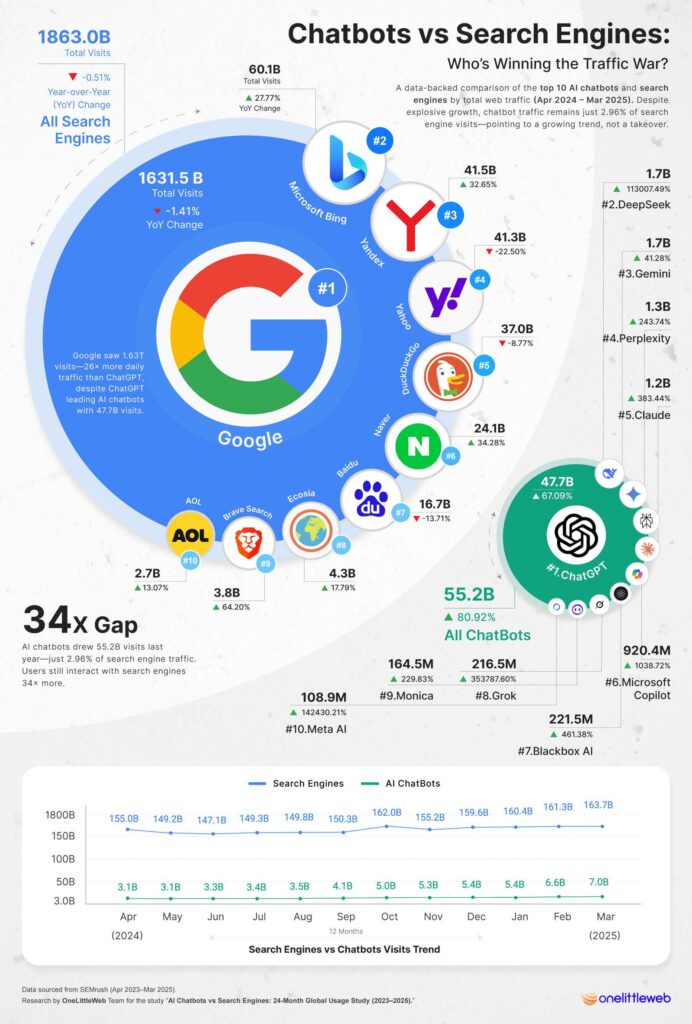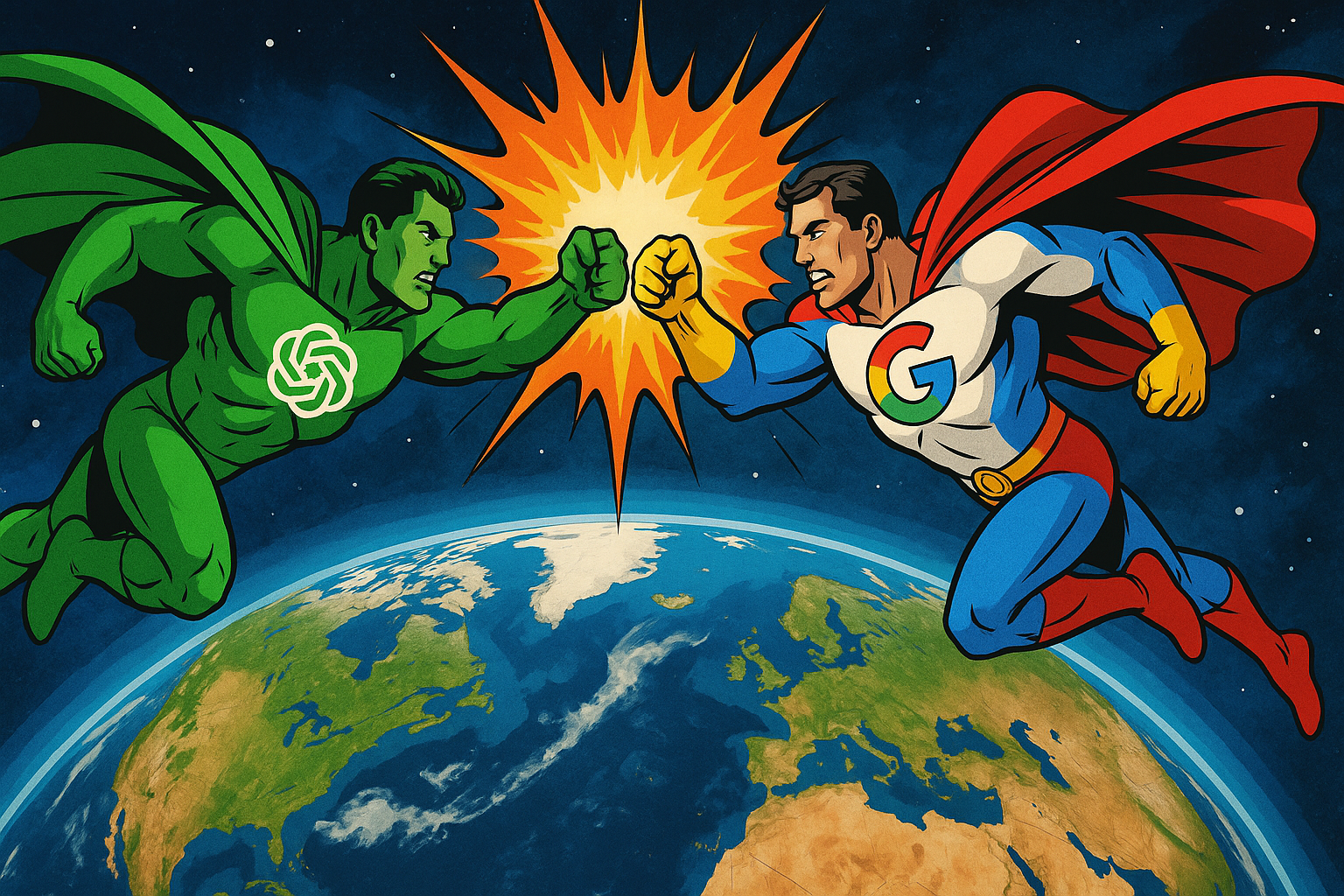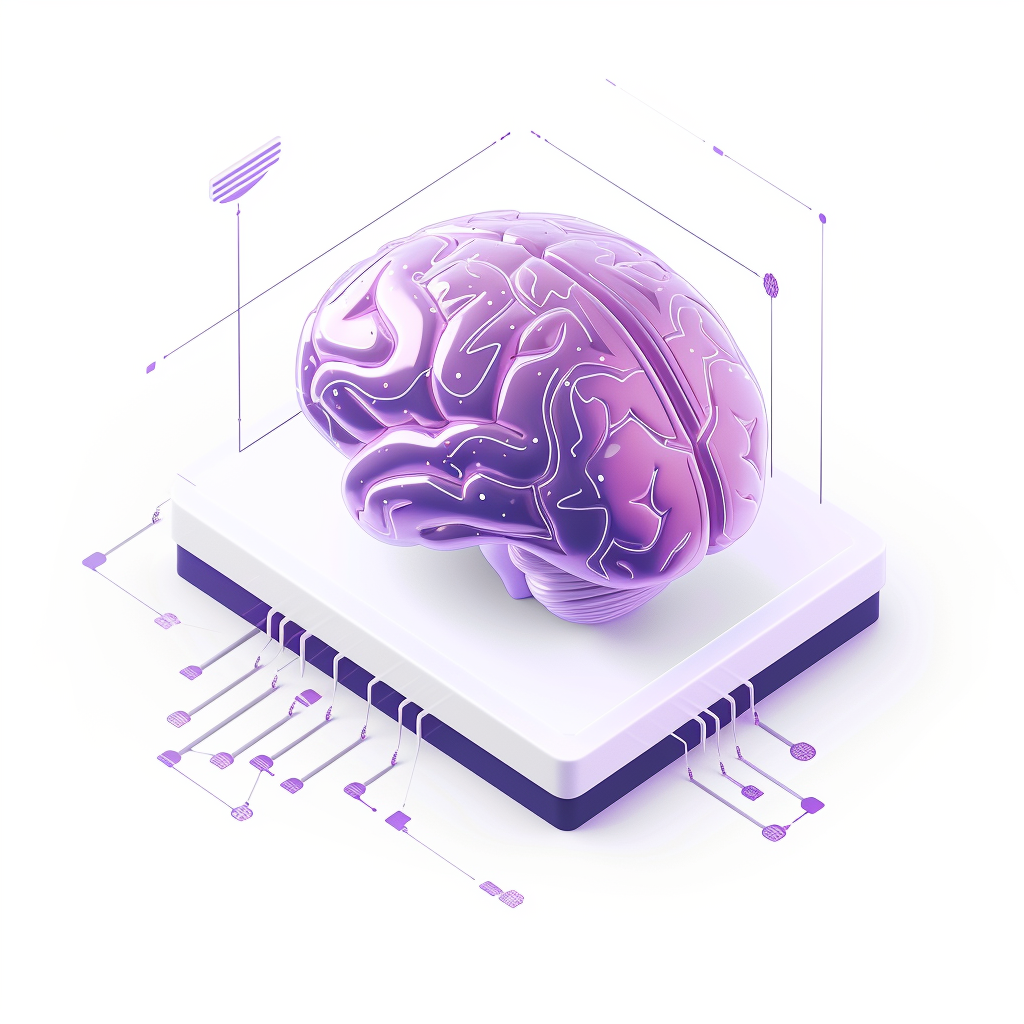It started as a trickle—curious users testing ChatGPT with simple questions instead of typing them into Google. A movie recommendation here, a quick explanation there. It felt novel, like a glimpse into the future.
Fast forward to 2025, and that trickle has turned into a tidal wave of traffic. AI chatbots like ChatGPT, Claude, Gemini, and Perplexity have become embedded in our daily routines—powering browsers, messaging apps, operating systems, and even search engines themselves. Users now expect instant, conversational answers with zero friction—no scrolling, no clicking, no ten blue links.
This behavior shift has sparked a major question across the tech and marketing industries: Are chatbots quietly replacing traditional search engines? Is Google’s two-decade reign under threat? Will SEO as we know it be disrupted—or destroyed?

To find out, we analyzed key findings from OneLittleWeb’s deep-dive study, which compared global traffic data for the top 10 AI chatbots and the top 10 search engines from April 2024 to March 2025. The report offers a rare, data-backed look at how fast AI is growing—and what that means for the future of search.
Despite the explosive growth of chatbots, the results are clear: search engines still dominate—but the gap is closing. Let’s break down what’s really going on—and what it means for the future of SEO, digital visibility, and the battle for attention online.
Chatbots Are Soaring…
Between April 2024 and March 2025, AI chatbots experienced an 80.92% surge in global traffic, reaching 55.2 billion total visits. And yes, that’s a massive leap. ChatGPT, the dominant player in this space, was responsible for over 86% of all chatbot traffic, with nearly 48 billion visits on its own.
This surge represents a shift in how users approach everyday information retrieval—especially for tasks like summaries, brainstorming, quick answers, and productivity hacks. But while those numbers sound impressive, they tell only half the story.
Compare that to search engines: in the same time frame, the top 10 search platforms racked up 1.86 trillion visits—about 34 times more than AI chatbots combined. ChatGPT may have gone viral, but Google still handles 26× more daily traffic than its AI rival.
…But Google Is Still Winning
While chatbot adoption skyrocketed, search engines saw only a minor dip: a 0.51% year-over-year decline. Google’s own traffic dropped 1.41%, down to 1.63 trillion visits—but that hardly qualifies as a crisis.
In fact, Google has been on a recovery arc since late 2024, thanks to smart product updates like AI Overviews and the Search Generative Experience (SGE). These new features blur the line between traditional search and AI chat—providing users with AI-written summaries directly in the results page, cutting down on the need to click at all. March 2025 saw Google rebound to 142.2 billion visits, its highest monthly traffic in a year.
So while some older platforms like Yahoo (down 22.5%) and DuckDuckGo (down 8.8%) are bleeding traffic, Google is adapting quickly—and it’s working.
Chatbots Are Disrupting, Not Replacing
If search engines are still dominant, what’s driving all this chatbot growth?
Simple: AI chatbots do things search engines can’t.
- They talk back. You don’t search—you converse. It feels more human.
- They summarize instantly. No need to click into a blog post or scroll through a forum thread.
- They generate, not just retrieve. Want a bedtime story or email draft? Google won’t help you there—ChatGPT will.
Platforms like DeepSeek and Grok exploded in 2025 with +113,007% and +353,787% traffic growth respectively. Even lesser-known names like Claude and Perplexity saw 3× to 5× year-over-year spikes, driven by upgrades like real-time data access and document uploads.
Still, this wave of adoption doesn’t suggest that chatbots are eating search. Instead, it points to a new layer in the information stack. Search engines index and rank. Chatbots synthesize and chat. One isn’t killing the other—they’re coexisting, and in many cases, converging.
Who’s Falling Behind
Some platforms missed the AI train altogether—and it’s showing.
Yahoo’s 22.5% traffic decline is a warning sign. With no AI integration and little product innovation, it’s becoming irrelevant to younger users. DuckDuckGo, despite launching a privacy-first chatbot interface, also fell back due to stagnant product updates and limited reach.
Compare that to Microsoft Bing, which saw a 27.77% growth spike thanks to its deep GPT-4 integrations via Copilot. It reached 225 million daily visits in March 2025—higher than all chatbots except ChatGPT.
Brave Search and Ecosia, meanwhile, saw strong performance by doubling down on mission-driven branding: privacy, sustainability, and ethics. Their lesson? Differentiation still works, even in an AI-dominated world.
What’s Really Happening
So, are AI chatbots replacing traditional search engines? Not even close. But they’re changing the rules of the game.
We’re not witnessing the death of search—we’re witnessing its evolution. AI chatbots are redefining how people interact with information online, favoring instant, conversational answers over traditional search-result pages. Meanwhile, search engines are rapidly adapting, integrating AI-generated overviews, summaries, and interactive interfaces directly into their core experiences.
What we’re seeing is not a battle for dominance, but a slow convergence: Search engines are becoming more conversational and AI-native. Chatbots are becoming more web-aware and better grounded in real-time data.
The line between “searching,” “chatting,” and “assisting” is already blurry—and soon, users won’t care what tool they’re using, as long as it gives them what they want fast.
For users, it’s a massive upgrade in experience. For marketers and SEO professionals, it’s a wake-up call.
Being visible on Google is no longer enough. You now need to think about how your brand or content shows up in AI-generated answers, across platforms. Search and AI aren’t competing. They’re merging. And those who adapt early will shape the future of visibility online.







